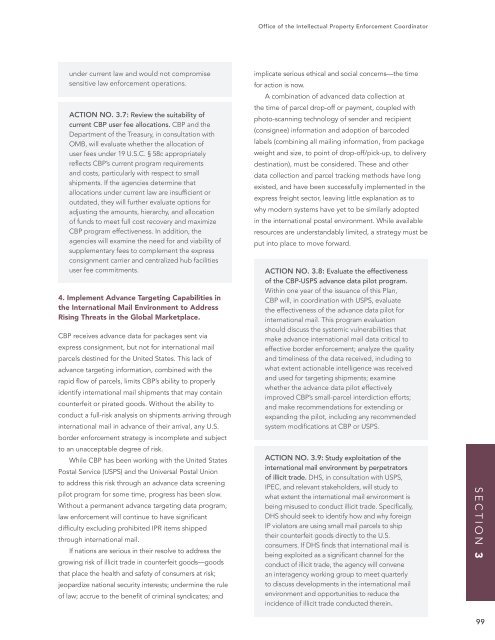ENFORCEMENT
eop_ipec_jointstrategicplan_hi-res
eop_ipec_jointstrategicplan_hi-res
You also want an ePaper? Increase the reach of your titles
YUMPU automatically turns print PDFs into web optimized ePapers that Google loves.
Office of the Intellectual Property Enforcement Coordinator<br />
under current law and would not compromise<br />
sensitive law enforcement operations.<br />
ACTION NO. 3.7: Review the suitability of<br />
current CBP user fee allocations. CBP and the<br />
Department of the Treasury, in consultation with<br />
OMB, will evaluate whether the allocation of<br />
user fees under 19 U.S.C. § 58c appropriately<br />
reflects CBP’s current program requirements<br />
and costs, particularly with respect to small<br />
shipments. If the agencies determine that<br />
allocations under current law are insufficient or<br />
outdated, they will further evaluate options for<br />
adjusting the amounts, hierarchy, and allocation<br />
of funds to meet full cost recovery and maximize<br />
CBP program effectiveness. In addition, the<br />
agencies will examine the need for and viability of<br />
supplementary fees to complement the express<br />
consignment carrier and centralized hub facilities<br />
user fee commitments.<br />
4. Implement Advance Targeting Capabilities in<br />
the International Mail Environment to Address<br />
Rising Threats in the Global Marketplace.<br />
CBP receives advance data for packages sent via<br />
express consignment, but not for international mail<br />
parcels destined for the United States. This lack of<br />
advance targeting information, combined with the<br />
rapid flow of parcels, limits CBP’s ability to properly<br />
identify international mail shipments that may contain<br />
counterfeit or pirated goods. Without the ability to<br />
conduct a full-risk analysis on shipments arriving through<br />
international mail in advance of their arrival, any U.S.<br />
border enforcement strategy is incomplete and subject<br />
to an unacceptable degree of risk.<br />
While CBP has been working with the United States<br />
Postal Service (USPS) and the Universal Postal Union<br />
to address this risk through an advance data screening<br />
pilot program for some time, progress has been slow.<br />
Without a permanent advance targeting data program,<br />
law enforcement will continue to have significant<br />
difficulty excluding prohibited IPR items shipped<br />
through international mail.<br />
If nations are serious in their resolve to address the<br />
growing risk of illicit trade in counterfeit goods—goods<br />
that place the health and safety of consumers at risk;<br />
jeopardize national security interests; undermine the rule<br />
of law; accrue to the benefit of criminal syndicates; and<br />
implicate serious ethical and social concerns—the time<br />
for action is now.<br />
A combination of advanced data collection at<br />
the time of parcel drop-off or payment, coupled with<br />
photo-scanning technology of sender and recipient<br />
(consignee) information and adoption of barcoded<br />
labels (combining all mailing information, from package<br />
weight and size, to point of drop-off/pick-up, to delivery<br />
destination), must be considered. These and other<br />
data collection and parcel tracking methods have long<br />
existed, and have been successfully implemented in the<br />
express freight sector, leaving little explanation as to<br />
why modern systems have yet to be similarly adopted<br />
in the international postal environment. While available<br />
resources are understandably limited, a strategy must be<br />
put into place to move forward.<br />
ACTION NO. 3.8: Evaluate the effectiveness<br />
of the CBP-USPS advance data pilot program.<br />
Within one year of the issuance of this Plan,<br />
CBP will, in coordination with USPS, evaluate<br />
the effectiveness of the advance data pilot for<br />
international mail. This program evaluation<br />
should discuss the systemic vulnerabilities that<br />
make advance international mail data critical to<br />
effective border enforcement; analyze the quality<br />
and timeliness of the data received, including to<br />
what extent actionable intelligence was received<br />
and used for targeting shipments; examine<br />
whether the advance data pilot effectively<br />
improved CBP’s small-parcel interdiction efforts;<br />
and make recommendations for extending or<br />
expanding the pilot, including any recommended<br />
system modifications at CBP or USPS.<br />
ACTION NO. 3.9: Study exploitation of the<br />
international mail environment by perpetrators<br />
of illicit trade. DHS, in consultation with USPS,<br />
IPEC, and relevant stakeholders, will study to<br />
what extent the international mail environment is<br />
being misused to conduct illicit trade. Specifically,<br />
DHS should seek to identify how and why foreign<br />
IP violators are using small mail parcels to ship<br />
their counterfeit goods directly to the U.S.<br />
consumers. If DHS finds that international mail is<br />
being exploited as a significant channel for the<br />
conduct of illicit trade, the agency will convene<br />
an interagency working group to meet quarterly<br />
to discuss developments in the international mail<br />
environment and opportunities to reduce the<br />
incidence of illicit trade conducted therein.<br />
SECTION 3<br />
99


